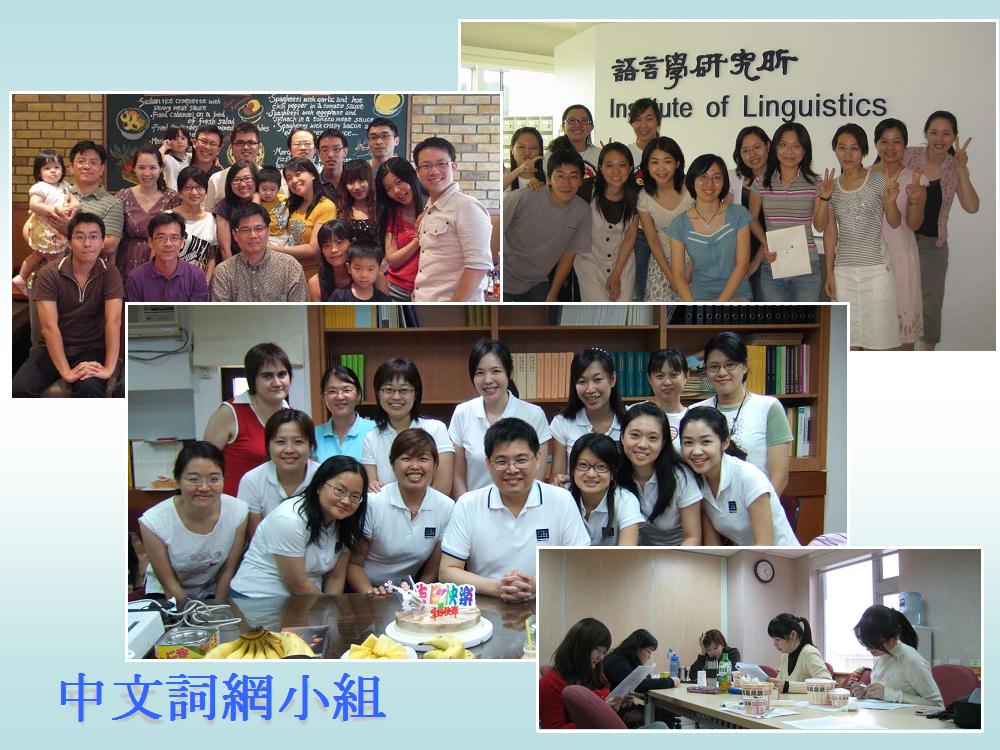中文詞彙網路 (CHINESE WORDNET)
中文詞彙網路 (Chinese Wordnet, 以下簡稱中文詞網) 計畫,目的是在提供完整的中文詞義 (sense) 區分與詞彙語意關係知識庫。我們相信詞義的區分與表達,必須建立在完善的詞彙語意學 (lexical semantics) 理論與知識本體 (ontology) 架構基礎上。在詞義理論與認知研究方面,這個詳細分析的詞彙知識庫系統,將成為語言學研究的基本參考資料。在實際的應用上,這個資料庫可望成為中文語言處理與知識工程不可或缺的基底架構。
本計劃自 2003 年起,迄今累積了近十年的研究成果,對詞義區分定義,與詞義知識表達方式,漸次做了修正。建構過程中,也曾多次發表於國內外相關研究機關與數個國際研討會議,得到了許多有價值的建議。中文詞網的網路搜尋介面,在 2006 年於中央研究院語言學研究所正式啟用,提供給各界檢索使用。到 2010 計畫執行結束前,網站資料與技術報告內容皆作同步更新。為了永續經營此項珍貴的中文詞彙資源,目前計畫網站轉由國立台灣大學語言學研究所維護。資料的動態更新與更細部的研究規劃,都在進行之中,歡迎各界先進同行加以使用與合作倡議。
在中文詞網的多年建構過程中,我們獲得許多先進學者的寶貴建議,在此無法一一致謝。當然,其中難免還有未改正的錯誤,我們會再虛心求教於大方後,在將來改進完善。
計畫主持人 黃居仁 謝舒凱 謹誌

The project of Chinese Wordnet (CWN) aims to provide a comprehensive knowledge base of sense distinction and lexical-semantic relations in Chinese. We believe that sense distinction and representation should be based on a solid framework of lexical semantics and ontology. With regard to meaning theories and cognitive research, this lexical knowledge base of detailed analyses can be a fundamental reference for linguistic studies and an indispensable infrastructure in application to Chinese natural language processing and ontology engineering.
Starting from 2003, this project has been gathering research results for nearly a decade and has been reconsidering and revising how senses should be disambiguated and represented. In the process of constructing CWN, we published our studies at several related research institutes as well as international conferences, and gained many valuable suggestions. In 2006, an query interface was officially released by the Institute of Linguistics, Academia Sinica for the use of the general public. Before the project came to an end in 2010, the contents and technical reports of CWN were periodically updated and synchronized. With an aim for CWN to achieve sustainable development, the project has now been transferred to and maintained by the Graduate Institute of Linguistics, National Taiwan University. How the data can be dynamically updated and some other finer research plans are under consideration. We welcome any feedbacks from users and researchers of wordnets.
In constructing CWN over the years, we have gained many valuable pieces of advice from so many scholars and researchers that we would not be able to acknowledge them one by one. And there certainly exist errors yet to be corrected. We remain open to criticisms and look forward to bettering CWN in the future.
from Project Leaders Chu-Ren Huang, Shu-Kai Hsieh


